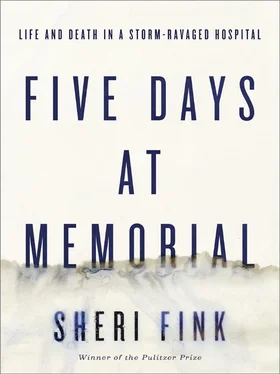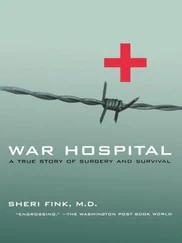Mulderick slammed her office door shut behind them to protect passersby from flying glass in case the windows shattered completely. The sturdy building shook violently. The sounds of the wind stealing through invisible crevices added to the aura of terror, a moaning, like a ghost, up and down the musical scale.
In the corridor, a panicked crew from plant operations ran toward Mulderick. “Glass is shattering all over the building!” they yelled. She was in charge. What did she want them to do?
It had fallen to Mulderick, the rotating hospital manager on call, to lead the hurricane response at Memorial as “incident commander.” She felt responsible for every patient, staff member, and visitor. Her job was to oversee all emergency operations, lead meetings, and make decisions with the hospital’s top executives. The fifty-four-year-old nursing director appeared well qualified for this job, with the authority of her thirty-two years of employment at the hospital—decades more than CEO L. René Goux, also present, who had been sent by Tenet to run Memorial only in 2003. Mulderick directed sixteen nursing departments and had more than fifteen years of experience on the hospital emergency committee, which she now led. When Hurricane Ivan had menaced and missed New Orleans a year earlier, she had also been at the helm, although Memorial’s emergency management plan called for the CEO, typically, to assume the role of incident commander.
Mulderick had another sort of crisis-management experience—the family kind. Like Pou, she belonged to a large, Catholic school–raised New Orleans brood. But as she grew up, despite the outings to City Park in perfect, matching Easter dresses and bonnets, beyond the swingset and white shingles, beneath the high ceilings and crystal chandeliers, a certain chaos reigned. The third of seven children, the care of her younger siblings had often fallen to her, and she emerged from childhood remarkably strong and calm, a manager, an emergency responder.
Mulderick began her nursing career in the ICU at Baptist in 1973 and never left. She raised her own children and painted as a hobby, but for more than three decades, she had given almost everything else of herself to the hospital. She rarely took a break and once, when she did, a deadly storm nearly ended her life. In 1982, after spending five years planning a trip to Las Vegas with friends from Southern Baptist and another local hospital, she and they were bumped off an overbooked flight at the last minute, leaving their suitcases behind on Pan Am 759. The 145 people on board that airplane plus eight more on the ground were lost when a violent form of wind shear, a microburst, blew the Boeing 727-200 back down to the ground soon after takeoff. Mulderick saw smoke billowing out of the trees from a window of the plane her group had boarded fifteen minutes later. True to her coolheaded nature, Mulderick did not tell her friends what she saw so as not to make them worry.
Hospital life and family life intertwined. One of Mulderick’s brothers died at Memorial after back surgery. A sister, with help from Dr. Horace Baltz, had been saved there from a bleeding brain aneurysm. Another sister worked at the hospital as an executive assistant, and Mulderick’s housemate, as a nursing coordinator. Mulderick held on to her position as a nursing director for more than a decade, through significant changes. Under financial pressure, Southern Baptist Hospital merged with a New Orleans Catholic hospital, Mercy, in the early 1990s and then both were sold to giant, for-profit Tenet Healthcare Corporation in 1995. Mercy-Baptist’s president didn’t hide his lack of enthusiasm for the sale when he announced it in prophetic terms: “Due to market-driven health-care reform, the days of stand-alone community hospitals are limited.”
Christmas decorating contests and the decades-old motto “Healing Humanity’s Hurt” disappeared. Gone, on paper, was the Baptist name; calling it that became a satisfying, if minor, form of rebellion. Now press releases extolled Memorial Medical Center’s “fiscally sound partnerships,” and “stronger financial performance.” Patient-care managers were given monthly budgets and productivity goals and took a beating if they failed to meet them. Success was rewarded with progressively tighter budgets. Mulderick adapted and survived.
Tall and fair-skinned, with straight red hair cut short in a pageboy, she had a tough, no-nonsense manner that intimidated some employees. She was known as calm and cool, even cold, under pressure.
After the maintenance crew came running to announce the breaking windows, Mulderick got on the phone with Cheri Landry. The senior intensive care nurse was camping in the new surgery building across Magnolia Street where Pou and her group were. Mulderick told Landry to get everyone out of there before the bridge linking the two buildings collapsed or its windows shattered. The staff members and their families would have to make a terrifying dash across its swaying, rattling expanse.
Anna Pou called one of her sisters before making the trip. “The walkway’s about to collapse. I have to run across it,” she said. “Just checking to make sure you all got out.” She learned that one sister, a dialysis nurse, had not left the city, staying instead in the flood-prone Lakeview neighborhood near Lake Pontchartrain. Pou knew she was tough, but she prayed for her anyway.
Mulderick went with the maintenance men to survey the hospital. They roped off the danger zones and moved patients out of exposed areas into interior hallways. In the ICU on the top floor, where Jannie Burgess and around twenty other patients were staying, the small patient rooms were arrayed along the building’s outer walls. Most patients were attached to oxygen tubing, IV pumps, and EKG monitors plugged into outlets and would be difficult to move away from windows. Instead, for the first time anyone could remember, maintenance crews had boarded up the windows with plywood from the inside.
The exposed sides of the windows shattered under a hail of rocks launched from nearby rooftops. The ICU filled with screams. Plywood grew wet and buckled. Water slipped inside to pool on the floors, creating another hazard. The father of one of the nurses on duty, who had taken shelter in the hospital with her, tried to stop his daughter from entering the area to do her work. The metal window frames strained and creaked like the Titanic , it seemed to one doctor, who finished up his work and headed to a lower floor. Several policemen were camping at the hospital, and a patient’s son brought one upstairs to insist his mother be moved into the corridor for safety. “If I had someplace else to move her, I would,” the nurse manager of the ICU, Karen Wynn, said, exasperated. “This is a clinical decision. This is not a decision he can make. We have to keep the patient safe, but also do what’s clinically appropriate.” The policeman understood, but the son didn’t. His rage threatened to ripple chaos into the calamity. “If you’re going to continue to be a problem, we will have you removed by the same cops you got,” Wynn told him. There was enough going on without this.
At 4:55 a.m., the supply of city power to the hospital failed. Televisions in patient rooms flicked off. Memorial’s auxiliary generators had already thumped to life and were playing counterpoint to the shrieks of the storm. The system was designed to supply only emergency lights, certain critical equipment, and a handful of outlets on each floor; the air-conditioning system shut down. Nurses trained box fans on their patients. There weren’t enough to go around.
On the sixth floor in the newly renovated family waiting room outside of Labor and Delivery, the windows shimmy shook so hard they blew themselves out with a sound like a sonic boom. Rain sheeted onto the carpeting. Elsewhere, winds funneled through broken windows and scrambled narrow aluminum blinds. In their offices, doctors drew drapes across picture windows and stanched leaks with hospital gowns and bed sheets, the scene outside black and thundery.
Читать дальше












